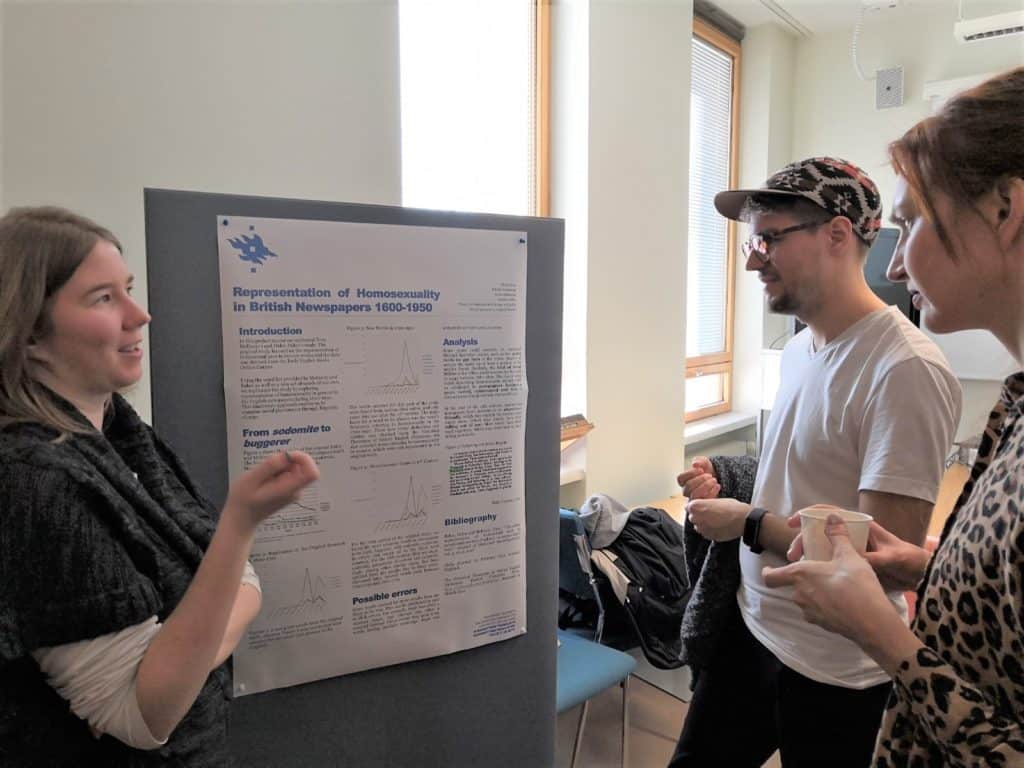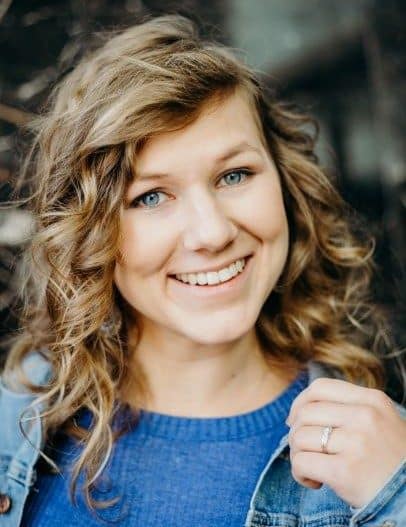│ By Rebekka Väisänen, Gale Ambassador at the University of Helsinki │
The English Philology corridor at the University of Helsinki has an area which we call the Aquarium, a glass-walled space that is often used for smaller faculty events, informal gatherings, and course “end offs” (the last meeting at the end of a course). On the 17th of April, I arrived there to see the poster presentations for the “Archives to Arguments” course, a module in which students use the Gale British Library Newspapers and other archives to do linguistic research into democratization.

Course participants Natalie Hiillos, Tuomas Salo, and Vilma Lauhakangas discussing one of the project posters.
I had previously met this group when running an introductory workshop about the Gale Primary Sources platform at the beginning of their course. In that workshop we looked at the different tools available within the platform like Topic Finder and Term Frequency graphs, and ran some searches to see what we would find.


“I think it’s a really useful resource – a really attractive resource – since it’s something the students can start using immediately,” said Dr. Turo Hiltunen, one of the professors running the course. “You don’t need a lot of technical background to be able to use these tools, and there’s a lot of data so the students can get something concrete to analyse very quickly.”
The students split into groups and chose a topic of research relating to democratization from a historical perspective, a field in which Dr. Hiltunen and his colleague Dr. Minna Palander-Collin are working. “We gave them some ideas, but ultimately the choice was theirs,” Turo explained. “They worked on things that they were interested in, and that is a brilliant thing about Gale, it provides a lot of data on virtually any topic you can think about. For a project like this, it was a really good resource.”
What’s more, between my initial workshop with the group and the poster presentations, students at the University of Helsinki had gained access to the Gale Digital Scholar Lab – an extremely accessible and intuitive platform in which users can undertake digital humanities research using the Gale primary source archives.
So, fast forwarding to the end of the course…three posters were up and ready to be presented.
Group 1 studied ingroup/outgroup positioning in coverage of the suffrage movement
One group decided to look at the suffrage movement, and they collected a corpus of 14,731 items by searching the Times Digital Archive for the key words women, vote and suffrage. They selected 12 editorials (such as this one), three from each decade between 1890–1930 for further analysis, using the OCR text files in the Gale Digital Scholar Lab. As stated in the research by Nepal, Ongley, Lauhakangas, and De Leeuw van Weenen, “The results suggest that the editorial writing in The Times shifted over time in accordance with the majority opinion of its readership, as it changed from opposing women’s right to vote to supporting it.” This was evidenced by the shift in ingroup/outgroup positioning. Initially “we” referred exclusively to men, while women and supporters of the suffrage movement were referred to as “them”. After 1920, with the effects of the war and the shifting opinion towards women’s rights, “we” began referring more generally to everyone. “Of course, this was a small scale study, so we cannot make blanket statements, but what we noticed, which also seems logical, [is that] the newspaper changed its tone as the times changed, to adapt to the opinions of the masses,” explained Leena Ongley.

When asked what she found the most interesting in this project’s research, Leena Ongley replied “in the late 1890s The Times recorded almost verbatim what went on in the parliament and it was just a hoot to read what the guys were saying, so I got lost just reading sometimes, because they were printing everything they said!”

Group 2 examined how the mentally ill were portrayed in British newspapers
The second group examined how the mentally ill were portrayed in British newspapers between 1800–1950 through looking at the changes in the use of words relating to them. They were especially interested in finding out whether the emergence of psychology (c. 1900) affected reporting. Tuomas Salo used the Gale Digital Scholar Lab to separate the data into “neat batches,” dividing the words and the time frames which were then depicted by graphs. He said that the Gale Digital Scholar Lab worked well with their data of 100 articles per term, but that it might be a bit trickier with larger data samples, as 100 is the maximum amount of articles you can put into a single data set. (I can confirm that this is a feature which has now been updated in the Gale Digital Scholar Lab! Users can now add up to 10,000 documents – the upper limit of a Content Set – in one go, directly from the results page.)
Airi Kawakami said that the most interesting fact she noticed in the data was the change in sentiment for the words insane and melancholia: “The sentiment was quite negative for both of the words already before 1900, but they were used for a variety of topics, for example medical and in advertisements” she explained, “but after 1900 it narrowed down, and the word insane was only used for murderers, and melancholia started to be used almost exclusively for suicides.”



Group 3 explored the representation of homosexuality in English newspapers
The third project explored the representation of homosexuality in English newspapers between 1600–1950 through a keyword search in the British Library Newspapers archive. Out of the words searched (including ingle, buggerer, sodomite, and he-whore) several peaked between 1720-1739 and in 1880-1899. The group explained that these could potentially be explained by historical events, such as the police raids on gay bars in the 1720s, and the trial of Oscar Wilde in the 1880s.

Overall, both the students and the professors felt that the course had been enjoyable, and the projects had been a success, and we all left the English corridor Aquarium a little bit wiser!
With thanks to the students of the 2018-19 “From Archives to Arguments” course at the University of Helsinki, and the course leaders, Doctors Turo Hiltunen and Minna Palander-Collin, for kindly agreeing that their university work, quotes and photos can be included in this blog post.
Photo credit: all author’s own photos.


